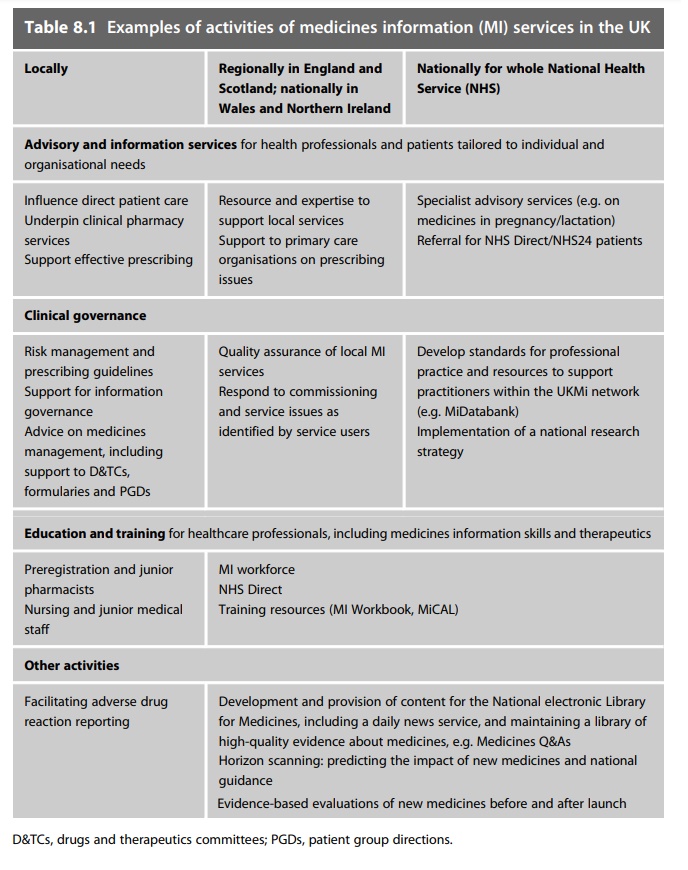Aims and strategy
| Home | | Hospital pharmacy |Chapter: Hospital pharmacy : Medicines information
The aim of the MI service is to facilitate high-quality patient care, through the promotion of the safe, effective and economic use of medicines, by the pro-vision of accurate, timely, appropriate, evidence-based and unbiased information and advice on all aspects relating to the use of medicines.
Aims and strategy
The aim of the MI
service is to facilitate high-quality patient care, through the promotion of
the safe, effective and economic use of medicines, by the pro-vision of
accurate, timely, appropriate, evidence-based and unbiased information and
advice on all aspects relating to the use of medicines. This has been the core
principle that has formed the framework of the service since its inception. By
fulfilling these aims the service has achieved its current high level of use,
acceptability and recognition amongst users and the broader NHS.

To maintain the
level and quality, core principles have been developed that underpin all the
activities of the service. These are set out in Table 8.2.
Table 8.2 Core medicines information
principles
1.
Apply evidence-based principles in the provision of impartial, evaluated,
accurate and timely information. This will be in a suitable format, that is,
pertinent to the user’s needs and readily understood
2.
Provide professional advice to support and influence clinical decisions with
respect to patient care and to enable the individual to make a balanced choice
3.
Keep abreast of developments in therapeutics, professional practice, technology
and information sources to support continuing professional development within
the specialty and to ensure that the service provided is as up to date as
possible
4. Be
readily accessible and responsive to user needs
5.
Network with others to share information and experience at local, regional and
national levels
As NHS changes have
given opportunities to develop MI there have also been increased demands on the
capacity of the MI service. In response, a 5-year UK-wide strategy, Better
Information for Managing Medicines, published in 2000, established a framework
for the provision and develop-ment of the service. The strategy, approved and
endorsed by health depart-ments across the UK, was implemented throughout the
service. The strategy was revised in 2007 to align it with prevailing NHS
strategy. The revised MI strategy, Effective Information for Managing
Medicines, has five key strategic aims:
·
Reflect a patient-focused NHS.
·
Develop the service to healthcare providers.
·
Develop healthcare staff.
·
Support NHS commissioning and planning bodies.
·
Collaborate effectively with other organisations at national
level.
Some of the main
drivers for the development of the service through this strategy include the
development of primary care trusts as the lead for healthcare provision and
commissioning, the continued role of UKMi in the development of NHS Direct in
England and Wales and NHS24 in Scotland, the expansion of new independent
non-medical prescribers (nurses, pharmacists and others), the provision of
guidance from national bodies such as the National Institute for Health and
Clinical Excellence (NICE), Scottish Medicines Consortium (SMC) and All-Wales
Medicines Strategy Group (AWMSG) and the need for effective management of new
medicine entry. The development of evidence-based information tech-nology
platforms, especially the National electronic Library for Medicines (NeLM) and
NHS Evidence, also influences the MI agenda, as they make information on
medicines directly available to health professionals and the public.
Related Topics
